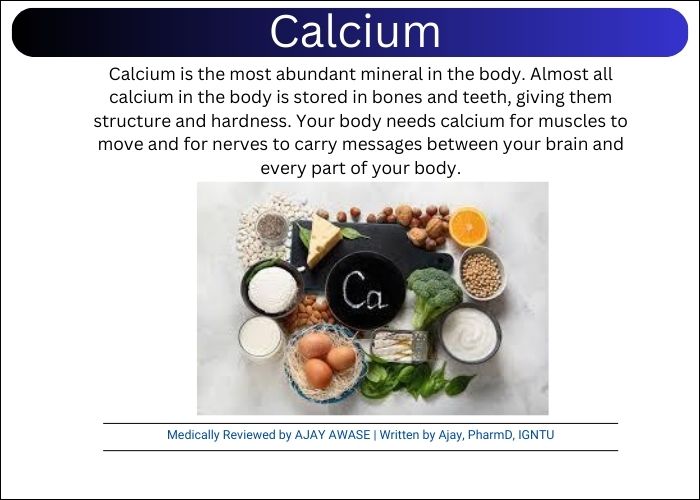The uses, risks, and other information of calcium
Medically Reviewed by AJAY AWASE | Written by Ajay, PharmD, IGNTU
Overview of calcium

A vital mineral called calcium can be found in a variety of meals, including dairy products. More than 99 percent of the calcium in the human body is found in the bones and teeth.
Bones constantly disintegrate and regenerate. This process requires calcium, but as we age, our bodies’ calcium concentration tends to decrease. Consuming additional calcium promotes bone growth and strength. Calcium is also necessary for the blood-clotting, heart, and neurological systems.
Oral calcium supplements are frequently used to treat and prevent low calcium levels, cramping in the muscles, osteoporosis, bone softening, and PMS. In addition, it is used to treat high blood pressure, cancer, stroke, and a host of other ailments; however, few of these additional uses have strong scientific backing.
Foods that include calcium and vitamin D are permitted to claim they may lower the risk of osteoporosis in the US and Canada.
Food Sources of Calcium:
Dairy products:Milk, cheese, yogurt
Leafy green vegetables: Kale, spinach, broccoli
Fortified foods: Cereals, orange juice, soy milk
Fish with edible bones: Sardines, salmon
Nuts and seeds: Almonds, sesame seeds
Legumes: Beans, lentils
Uses of Calcium
Calcium is a vital mineral that plays numerous roles in the body. Here are some of its primary uses:
- Bone and Teeth Health: The main component that gives teeth and bones their strength and structure is calcium.
- Muscle Function: It supports the regulation of cardiac and other muscle contractions.
- Nerve Function: The transmission of nerve signals between the brain and the body is made possible by calcium.
- Blood Clotting: It contributes to the process of blood coagulation.
- Hormone Regulation: Some hormones, like parathyroid hormone, which is involved in calcium metabolism, are regulated by calcium.
Efficient for
Gastric distress (dyspepsia). Digesting calcium carbonate orally as an antacid works well for dyspepsia.
elevated blood potassium levels, or hyperkalemia. Giving intravenous calcium gluconate can treat heart issues brought on by elevated potassium levels. Only medical professionals are authorized to administer IV products.
Low blood calcium levels, or hypocalcemia. Low calcium levels can be effectively treated and prevented with calcium supplements and intravenous drips. Only medical professionals are authorized to administer IV products.
renal failure. For those with renal failure, oral calcium carbonate or calcium acetate is an efficient way to lower elevated blood phosphate levels. When kidney failure patients take calcium orally, their blood pressure appears to drop as well.
Side Effects
When taken orally, calcium is probably safe when used in the suggested dosage range of 1000–1200 mg per day. Belching and flatulence are two minor adverse effects of calcium. However, if calcium is consumed in amounts higher than the daily tolerated upper intake level (UL), it may be hazardous. For people aged 19 to 50, the UL is 2500 mg, while for those over 50, it is 2000 mg. Overdosing on this medication on a daily basis may raise the risk of major adverse effects.
Special Precautions and Warnings Regarding Calcium
While calcium is essential for good health, it’s important to be mindful of the following:
- Excessive Intake: Hypercalcemia (high blood calcium levels), kidney stones, and constipation are among the negative effects of consuming excessive amounts of calcium.
- Vitamin D: Absorption of calcium is dependent on vitamin D. Make sure your food or supplements are providing you with enough vitamin D.
- Medical Conditions: In case you suffer from any of the following medical disorders, your doctor can advise you to restrict or keep an eye on your calcium intake: kidney stones, hyperparathyroidism.
- Medications: Certain drugs may make it more difficult for the body to absorb calcium or raise the possibility of adverse effects involving calcium. If you take any drugs, talk to your doctor.
- Age: Your body’s capacity to absorb calcium may decline with age. For this reason, compared to younger ones, elderly folks frequently need to ingest more calcium.
Speak with a healthcare provider if you are worried about your calcium consumption or if you are exhibiting signs of either an excess or a shortage of the mineral. They are able to evaluate your particular requirements and offer tailored guidance.
Calcium Interactions
Certain drugs and calcium may interact, possibly reducing their effectiveness or producing unwanted side effects. If you take any medications, it’s crucial to be aware of these interactions and speak with your doctor before taking calcium supplements.
Here are some common medications that can interact with calcium:
- Tetracycline antibiotics: Tetracycline medicines, including doxycycline, minocycline, and tetracycline, can have their absorption of calcium decreased.
- Thyroid medication: Hypothyroidism may result from calcium’s interference with the thyroid medication’s absorption.
- Iron supplements: The absorption of iron from iron supplements may be hindered by calcium.
- Bisphosphonates: These medications interact with calcium, which may lessen their efficacy in treating osteoporosis.
- Levothyroxine: Levothyroxine, a thyroid hormone prescription, may not work as well when used with calcium.


Leave a Reply